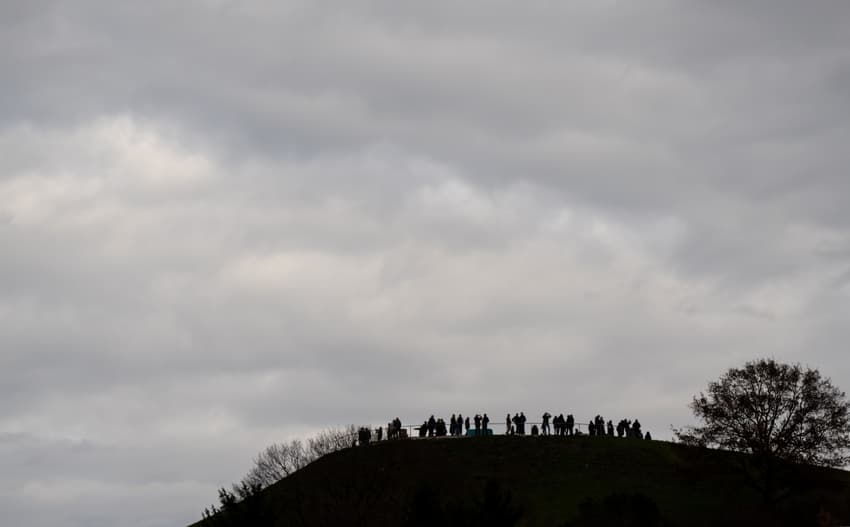'Existential fears': How Germans are feeling about the start of 2023

In an annual survey, the majority of Germans were pessimistic about what to expect in the coming year - but still had a few reasons to be hopeful.
In a survey conducted in cooperation with the Ipsos Institute and Hamburg-based futurologist Horst Opaschowski, only 35 percent of respondents affirmed the statement: "I look forward to the coming year with great confidence and optimism. I expect better times."
A year earlier, 53 percent of respondents said they were entering the new year with optimism; at the turn of 2021, the figure stood at 56 percent. The survey encompasses 1,000 respondents over the age of 14 from across Germany.
A similar survey commissioned by British American Tobacco's (BAT) Hamburg Foundation for Future Issues found that 64 percent of Germans were looking ahead at 2023 with Angst (fear) - more than twice as many as ten years ago.
2022: ‘The worst year’
The future-looking figures are perhaps not surprising, as they follow what many Germans saw as a crisis year.
In a recent Allensbach survey for the Frankfurter Allgemeine Zeitung, 61 percent agreed with the statement: "If you think about the current crises and problems, 2022 was the worst year in a long time.”
"The Ukraine war and its economic consequences are pulling people down mentally,” Opaschowski added.
Since Russia’s invasion of Ukraine on February 24th, Germany has been impacted by rising energy prices and sky-high inflation, “leading to financial challenges for many people in Germany,” said Ulrich Reinhardt, scientific director of the BAT foundation.

A supermarket trolley full of groceries. The prices of everyday items have gone up considerable in Germany in recent months. Photo: picture alliance/dpa | Fabian Sommer
Increasing wealth gap
Turbulent economic times mean that people are plagued by existential fears, said Opaschowski. "Ninety percent of the German population is now very concerned about the growing gap between rich and poor."
People in rural areas and the generation aged 55 and older were particularly worried. Only among 14- to 24-year-olds did optimism still prevail, at 56 percent.
But what are the factors giving people some hope? On the one hand, the government, which is proving itself as a crisis helper, said Opaschowski.
According to the survey, 88 percent of respondents "think it's good that our welfare state also takes care of people who, for various reasons, are not able to earn a living to a sufficient extent themselves.”
However, this does not mean that people are completely reliant on state support, he added.
In light of higher costs in 2022, more people in Germany started saving on their own initiative, according to the survey. Seventy percent of those surveyed said they would be more moderate in their consumption and spending in the coming year, up from 58 percent in 2020.
READ ALSO: EXPLAINED: 10 ways to save money on your groceries in Germany
This savings mentality is already practiced by Germany’s wartime and postwar generations, said Opaschowski, who at 81-years old belongs to theses groups himself.
"People are creating a heavy ration for emergencies, from pennies to cans of food."
Sixty-four percent of those surveyed were convinced that people will once again stick together more and help each other, he said. The older generation supports the younger generation and is prepared to make cuts.
According to Opaschowski's analysis, Germans are also concerned about the lack of affordable housing, the medical care crisis and increasing loneliness.
READ ALSO: REVEALED: How Germany's new government wants to tackle the housing crisis
"The fear of losing self-determination in life and becoming a nursing case is a very personal disaster," the 81-year-old said.
Climate change, he said, remains an ongoing worry, along with the coronavirus and the war in Ukraine.
At the same time, it is clear that people are longing for a better mood. Almost three-quarters, or 73 percent of those surveyed by the BAT Foundation, want to think and act more calmly and optimistically in the new year.
Comments
See Also
In a survey conducted in cooperation with the Ipsos Institute and Hamburg-based futurologist Horst Opaschowski, only 35 percent of respondents affirmed the statement: "I look forward to the coming year with great confidence and optimism. I expect better times."
A year earlier, 53 percent of respondents said they were entering the new year with optimism; at the turn of 2021, the figure stood at 56 percent. The survey encompasses 1,000 respondents over the age of 14 from across Germany.
A similar survey commissioned by British American Tobacco's (BAT) Hamburg Foundation for Future Issues found that 64 percent of Germans were looking ahead at 2023 with Angst (fear) - more than twice as many as ten years ago.
2022: ‘The worst year’
The future-looking figures are perhaps not surprising, as they follow what many Germans saw as a crisis year.
In a recent Allensbach survey for the Frankfurter Allgemeine Zeitung, 61 percent agreed with the statement: "If you think about the current crises and problems, 2022 was the worst year in a long time.”
"The Ukraine war and its economic consequences are pulling people down mentally,” Opaschowski added.
Since Russia’s invasion of Ukraine on February 24th, Germany has been impacted by rising energy prices and sky-high inflation, “leading to financial challenges for many people in Germany,” said Ulrich Reinhardt, scientific director of the BAT foundation.

Increasing wealth gap
Turbulent economic times mean that people are plagued by existential fears, said Opaschowski. "Ninety percent of the German population is now very concerned about the growing gap between rich and poor."
People in rural areas and the generation aged 55 and older were particularly worried. Only among 14- to 24-year-olds did optimism still prevail, at 56 percent.
But what are the factors giving people some hope? On the one hand, the government, which is proving itself as a crisis helper, said Opaschowski.
According to the survey, 88 percent of respondents "think it's good that our welfare state also takes care of people who, for various reasons, are not able to earn a living to a sufficient extent themselves.”
However, this does not mean that people are completely reliant on state support, he added.
In light of higher costs in 2022, more people in Germany started saving on their own initiative, according to the survey. Seventy percent of those surveyed said they would be more moderate in their consumption and spending in the coming year, up from 58 percent in 2020.
READ ALSO: EXPLAINED: 10 ways to save money on your groceries in Germany
This savings mentality is already practiced by Germany’s wartime and postwar generations, said Opaschowski, who at 81-years old belongs to theses groups himself.
"People are creating a heavy ration for emergencies, from pennies to cans of food."
Sixty-four percent of those surveyed were convinced that people will once again stick together more and help each other, he said. The older generation supports the younger generation and is prepared to make cuts.
According to Opaschowski's analysis, Germans are also concerned about the lack of affordable housing, the medical care crisis and increasing loneliness.
READ ALSO: REVEALED: How Germany's new government wants to tackle the housing crisis
"The fear of losing self-determination in life and becoming a nursing case is a very personal disaster," the 81-year-old said.
Climate change, he said, remains an ongoing worry, along with the coronavirus and the war in Ukraine.
At the same time, it is clear that people are longing for a better mood. Almost three-quarters, or 73 percent of those surveyed by the BAT Foundation, want to think and act more calmly and optimistically in the new year.
Join the conversation in our comments section below. Share your own views and experience and if you have a question or suggestion for our journalists then email us at [email protected].
Please keep comments civil, constructive and on topic – and make sure to read our terms of use before getting involved.
Please log in here to leave a comment.